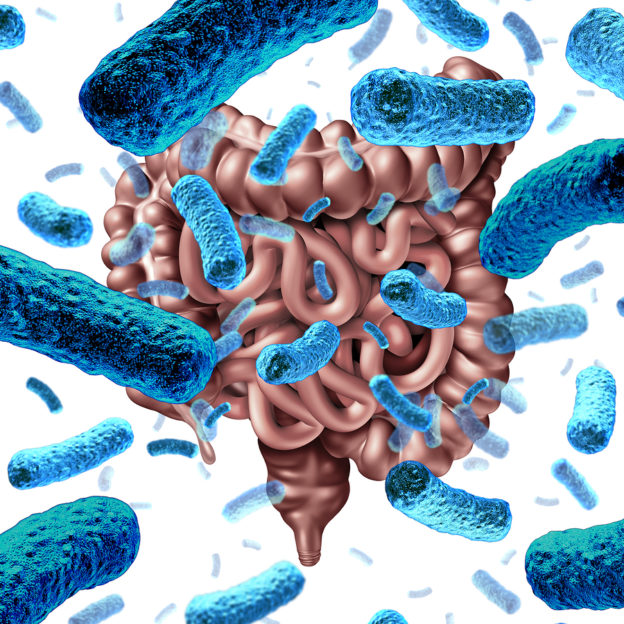By David Blyweiss, M.D., Advanced Natural Wellness
May 24, 2021
The microbial composition of your gut microbiome started forming before you were even born. It basically starts out with whatever Mom had in her uterine microbiome. If you were born vaginally you picked up your Mom’s microbiome on your way through the birth canal.
Then, if you were breastfed, you got more of your mother’s microbiome shaping a healthier gut and immune system. If you were formula fed, it changed in a not so good way. You didn’t get the usual microbes and immune enhancers that come from your mother’s milk.
It changed again when you started eating the foods they fed you when you were six months old, like strained peas. And again, when you went on solid foods.
Any antibiotics you were given at this early age wiped out your beneficial bacteria for a good year. Unfortunately, this can set you up for future chronic health issues like allergies and auto-immune disease, inflammatory bowel disease being one of the most common I see in practice. NSAID pain relievers, proton pump inhibitors and so many other OTC and prescription medications can also ruin your microbiota.
So you can see that your microbiome can change a great deal in a short period of time. And it will continue to do so throughout your lifetime.
A lot of the changes depend on your diet. Some foods help friendly anti-inflammatory bacteria to thrive. Other foods limit good bacteria and increase levels of the unhealthy bacteria that cause inflammation.
MD Exposes the Hidden Danger to Your Eyes

When your eyesight starts to fail, it's a real problem. Suddenly you can't go to the grocery store... you can't get to the doctor if you have an emergency... you can't meet your friends for dinner…
Your "regular" doctor doesn't have time to keep up with the latest research. And the same goes for eye doctors. They go to school to learn how to fit you for glasses and contacts, but have no way of preventing the damage and loss of eyesight that threatens your freedom and independence.
Let me show you something that explains a LOT about how your eyes work.
In my FREE Special Report, I'll show you a HUGE, untapped resource for your eyes that safely and naturally restores clear, effortless eyesight.
Click here to get started...
Here’s the thing. When your gut microbiota gets out of balance, it can have an effect on so many things. This makes managing the health of your gut microbiome very important.
What does Your Gut Microbiota do for You?
Intestinal bacteria make up 70% of your immune system. And right now, strong immunity is more important than ever.
But it’s much more than that.
Did you know that those microbes can have an effect on your weight? People who are overweight have specific changes in their microbiome that promote weight gain. And the food they eat plays a role in it. A Western style diet filled with imbalanced ratios of omega 3 versus omega 6 fatty fats and refined carbs increase intestinal microbiota linked to obesity.
But when people who are overweight change their microbiota with prebiotics and probiotics, they are able to lose weight and fat mass, and lower their BMI.
And I’m sure you’ve heard that your gut microbiota plays a role in irritable bowel syndromes. When the “good” bacteria and “bad” bacteria get out of balance, it leads to inflammation in the GI tract. And it can end up running your life.
Because of the close relationship between diet and the human microbiome, diet changes can work wonders in treating the condition.
Even more worrisome?
Metabolites from your gut microbiome can cause low-grade inflammation in most body systems. I’m talking about the vascular system, the nervous system, the endocrine system and more. This means they can influence your risk of things like diabetes, heart disease and cancer.
Are You Suffering From...
- Love handles and a pot belly
- Romance that isn't what it used to
- Forgetfulness and inattention
- Low (or no) strength and endurance
- A sex drive that's shifted into neutral...or worse
If so...you may have Mature Male Burnout. Click here to discover more about this unique condition and what you can do about it.
Your gut may even play a role in Alzheimer’s disease. People with Alzheimer’s have less microbial diversity in their gut microbiomes.
The gut microbe is also implicated in food allergies, asthma and arthritis.
But can you just imagine? Dietary changes to reinoculate your gut with good bacteria can give you a measure of protection against all of these things!
How to Reinoculate Your Gut
A more vegetarian diet is associated with a healthy, diverse microbiota. A western diet, not so much. So the foods you eat will determine whether your gut is filled with “good” or “bad” bacteria.
Here are a few pieces of advice to keep your gut and body healthy:
- Eat 85% organic plant-based foods from all colors of the rainbow. This will help increase the broadly beneficial bacteria, including those that make the neurotransmitters that help your brain.
- Avoid antibiotics unless they are absolutely necessary. They decimate certain populations of bacteria, like napalming a forest. This can change the balance of your immune system and decrease vitamin B production.
- Feed your microbiome probiotics and then feed your probiotics with prebiotics.
- Don’t eat conventionally raised meats and other animal products. These animals are dosed with antibiotics so the drugs will pass along to you. Instead, opt for organic grass-fed animal products.
- Stay away from processed foods. The excessive sugars combined with “dead nutrients” will feed bad bacteria in your gut.
- Avoid things like chlorinated and fluoridated water and agricultural chemicals like Round Up®(glyphosate)
If you take good care of the microbes in your gut, they will help take good care of you.
SOURCES:
Younge N, et al. Fetal exposure to the maternal microbiota in humans and mice. JCI Insight. 2019;4(19):e127806.
Vighi G, et al. Allergy and the gastrointestinal system. Clin Exp Immunol. 2008;153 Suppl 1(Suppl 1):3-6.
Davis CD. The Gut Microbiome and Its Role in Obesity. Nutr Today. 2016;51(4):167-174.
John GK, et al. Dietary Alteration of the Gut Microbiome and Its Impact on Weight and Fat Mass: A Systematic Review and Meta-Analysis. Genes (Basel). 2018;9(3):167. Published 2018 Mar 16.
Menees S, et al. The gut microbiome and irritable bowel syndrome. F1000Res. 2018;7:F1000 Faculty Rev-1029.
Albenberg LG, et al. Food and the gut microbiota in inflammatory bowel diseases: a critical connection. Curr Opin Gastroenterol. 2012;28(4):314-320.
Durack J, et al. The gut microbiome: Relationships with disease and opportunities for therapy. J Exp Med. 2019;216(1):20-40.
Jiang C, et al. The Gut Microbiota and Alzheimer’s Disease. J Alzheimers Dis. 2017;58(1):1-15.
Kowalski K, et al. Brain-Gut-Microbiota Axis in Alzheimer’s Disease. J Neurogastroenterol Motil. 2019;25(1):48-60.
Lee KH, et al. The gut microbiota, environmental factors, and links to the development of food allergy. Clin Mol Allergy 18, 5 (2020).
Begley L, et al. Gut microbiota relationships to lung function and adult asthma phenotype: a pilot study. BMJ Open Respiratory Research. 2018;5:e000324.
Favazzo LJ, et al. The gut microbiome-joint connection: implications in osteoarthritis. Curr Opin Rheumatol. 2020;32(1):92-101.







